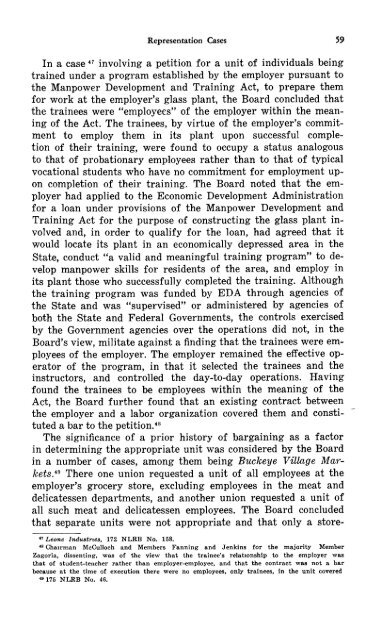1 - National Labor Relations Board
1 - National Labor Relations Board
1 - National Labor Relations Board
You also want an ePaper? Increase the reach of your titles
YUMPU automatically turns print PDFs into web optimized ePapers that Google loves.
Representation Cases 59<br />
In a case 4 7 involving a petition for a unit of individuals being<br />
trained under a program established by the employer pursuant to<br />
the Manpower Development and Training Act, to prepare them<br />
for work at the employer's glass plant, the <strong>Board</strong> concluded that<br />
the trainees were "employees" of the employer within the meaning<br />
of the Act. The trainees, by virtue of the employer's commitment<br />
to employ them in its plant upon successful completion<br />
of their training, were found to occupy a status analogous<br />
to that of probationary employees rather than to that of typical<br />
vocational students who have no commitment for employment upon<br />
completion of their training. The <strong>Board</strong> noted that the employer<br />
had applied to the Economic Development Administration<br />
for a loan under provisions of the Manpower Development and<br />
Training Act for the purpose of constructing the glass plant involved<br />
and, in order to qualify for the loan, had agreed that it<br />
would locate its plant in an economically depressed area in the<br />
State, conduct "a valid and meaningful training program" to develop<br />
manpower skills for residents of the area, and employ in<br />
its plant those who successfully completed the training. Although<br />
the training program was funded by EDA through agencies of<br />
the State and was "supervised" or administered by agencies of<br />
both the State and Federal Governments, the controls exercised<br />
by the Government agencies over the operations did not, in the<br />
<strong>Board</strong>'s view, militate against a finding that the trainees were employees<br />
of the employer. The employer remained the effective operator<br />
of the program, in that it selected the trainees and the<br />
instructors, and controlled the day-to-day operations. Having<br />
found the trainees to be employees within the meaning of the<br />
Act, the <strong>Board</strong> further found that an existing contract between<br />
the employer and a labor organization covered them and constituted<br />
a bar to the petition.48<br />
The significance of a prior history of bargaining as a factor<br />
in determining the appropriate unit was considered by the <strong>Board</strong><br />
in a number of cases, among them being Buckeye Village Markets.<br />
49 There one union requested a unit of all employees at the<br />
employer's grocery store, excluding employees in the meat and<br />
delicatessen departments, and another union requested a unit of<br />
all such meat and delicatessen employees. The <strong>Board</strong> concluded<br />
that separate units were not appropriate and that only a store-<br />
47 Leone Industries, 172 NLRB No. 158.<br />
° Ch airman McCulloch and Members Fanning and Jenkins for the majority Member<br />
Zagoria, dissenting, was of the view that the trainee's relationship to the employer was<br />
that of student-teacher rather than employer-employee, and that the contract was not a bar<br />
because at the time of execution there were no employees, only trainees, in the unit covered<br />
49 175 NLRB No. 46.

















